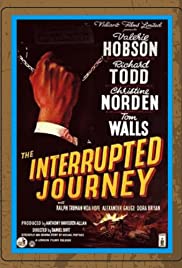
THE INTERRUPTED JOURNEY
UK, 1949, 80 minutes, Black-and-white.
Valerie Hobson, Richard Todd, Christine Norden, Tom Walls, Alexander Gauge, Ralph Truman, Dora Bryan, Vincent Ball.
Directed by Daniel Birt.
The interrupted Journey is a brief British psychological drama from the 1940s. The star is Richard Todd who was emerging both in England and in the United States (The Hasty Heart) and was to star in Disney films like Rob Roy and The Sword and the Rose, then moving into war films like the Dam Busters. Valerie Hobson had been a veteran of British films since the 1930s but was soon to end her career to be wife and mother. There is a strong supporting British cast.
Richard Todd plays a man running away with the wife of a client, Christine Norden, posting a letter to his wife as explanation. On the train he has qualms and pulls the emergency cord, hurrying home to his wife, but the train crashing and the woman being killed.
He is tense at home, being supported by his wife, telling the truth, encountering the rail inspector, then the detective – and the explanation that the crash was not caused by the pulling of the cord but by signal failure, and then a twist with the fact that the woman had been shot and her husband dead on the train.
He then decides to go to the hotel where the booking was and finds the husband alive, drinking and threatening.
Then he comes to. It has only been a few minutes on the train – the situation is repeated, this time the woman pulling the cord, his hurrying home, fearing the crash – which does not happen. It is a conscience premonition story.
1. The title? The train, pulling the cord, John getting off, the consequences?
2. The British setting, the train, the countryside, home, Devon and the hotel? The musical score?
3. The narrative, straightforward, the twist at the end, Jervis and his attack on John, John coming to consciousness, on the train, the discussions with Susan, pulling the cord, getting off, at home – and the sound of the train, and its not crashing?
4. The character of John, age and experience, his marriage, love for his wife, the decision to leave, the encounter with Susan, the work connection, his dislike of Jervis? Their leaving on the train, the express, the hotel booking? Writing the letter, for his wife? Posting it? The delivery and his collecting the letter, burning it, not completely and Carol seeing it?
5. On the train, the plans for the future? His doubts, pulling the cord, the train stopping, his jumping off? Hurrying to his home? The train crash?
6. Carol, at home, love for her husband, the tension between them? His return, being jumpy, the newspapers and the headlines? The rail inspector? The detective? Interrogation? The pulling of the cord as the reason for the crash? Later discounted? The signals? His not being to blame?
7. The effect on John, his love for his wife, regretting what he had done, telling the truth, the reconciliation, the support?
8. The personalities of the rail inspector, the questions? John going to the pub, the inspector present? His nerves? The personality of the detective?
9. The mystery of the bodies in the train? Jervis as dead? The sudden news that Susan had been shot? John and the discussions with Carol, determining to go to the hotel?
10. His travel, the hotel booking, Jervis present, climbing the wall, the confrontation with Jervis, his drinking, maniacal, the gun, the shooting?
11. John coming to consciousness, only a few minutes passing, the return to Susan, the discussion, to return to Carol? Susan pulling the cord?
12. John returning, his explanation to Carol? The hearing of the train signal? Looking out the window – but the train not crashing?
13. The film as a conscience premonition?